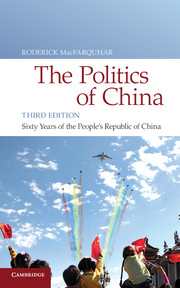Book contents
- Frontmatter
- Contents
- Tables and Maps
- Preface
- Abbreviations
- Introduction
- Chapter 1 The establishment and consolidation of the new regime, 1949–1957
- Chapter 2 The great leap forward and the split in the Yan'an leadership 1958–1965
- Chapter 3 The Chinese State in crisis, 1966–1969
- Chapter 4 The succession to Mao and the end of Maoism, 1969–1982
- Chapter 5 The road to Tiananmen: Chinese politics in the 1980s
- Chapter 6 Reaction, Resurgence, and Succession: Chinese Politics since Tiananmen
- Chapter 7 Dilemmas of globalization and governance
- Appendix Leaders and Meetings
- References
- Index
- References
Chapter 6 - Reaction, Resurgence, and Succession: Chinese Politics since Tiananmen
Published online by Cambridge University Press: 05 June 2012
- Frontmatter
- Contents
- Tables and Maps
- Preface
- Abbreviations
- Introduction
- Chapter 1 The establishment and consolidation of the new regime, 1949–1957
- Chapter 2 The great leap forward and the split in the Yan'an leadership 1958–1965
- Chapter 3 The Chinese State in crisis, 1966–1969
- Chapter 4 The succession to Mao and the end of Maoism, 1969–1982
- Chapter 5 The road to Tiananmen: Chinese politics in the 1980s
- Chapter 6 Reaction, Resurgence, and Succession: Chinese Politics since Tiananmen
- Chapter 7 Dilemmas of globalization and governance
- Appendix Leaders and Meetings
- References
- Index
- References
Summary
Tiananmen shook the Chinese Communist Party (CCP) to its core. The charge leveled against former general secretary Zhao Ziyang was that “[a]t the critical juncture involving the life and death of the Party and state, he made the mistake of supporting turmoil and splitting the Party, and he bears unshirkable responsibility for the formation and development of the turmoil. The nature and consequences of his mistakes are very serious.” The issues the Party faced, however, ran far deeper than even this charge suggested. Tiananmen threw open a whole series of questions that had been simmering just below the surface for years.
- Type
- Chapter
- Information
- The Politics of ChinaSixty Years of The People's Republic of China, pp. 468 - 527Publisher: Cambridge University PressPrint publication year: 2011
References
- 3
- Cited by

